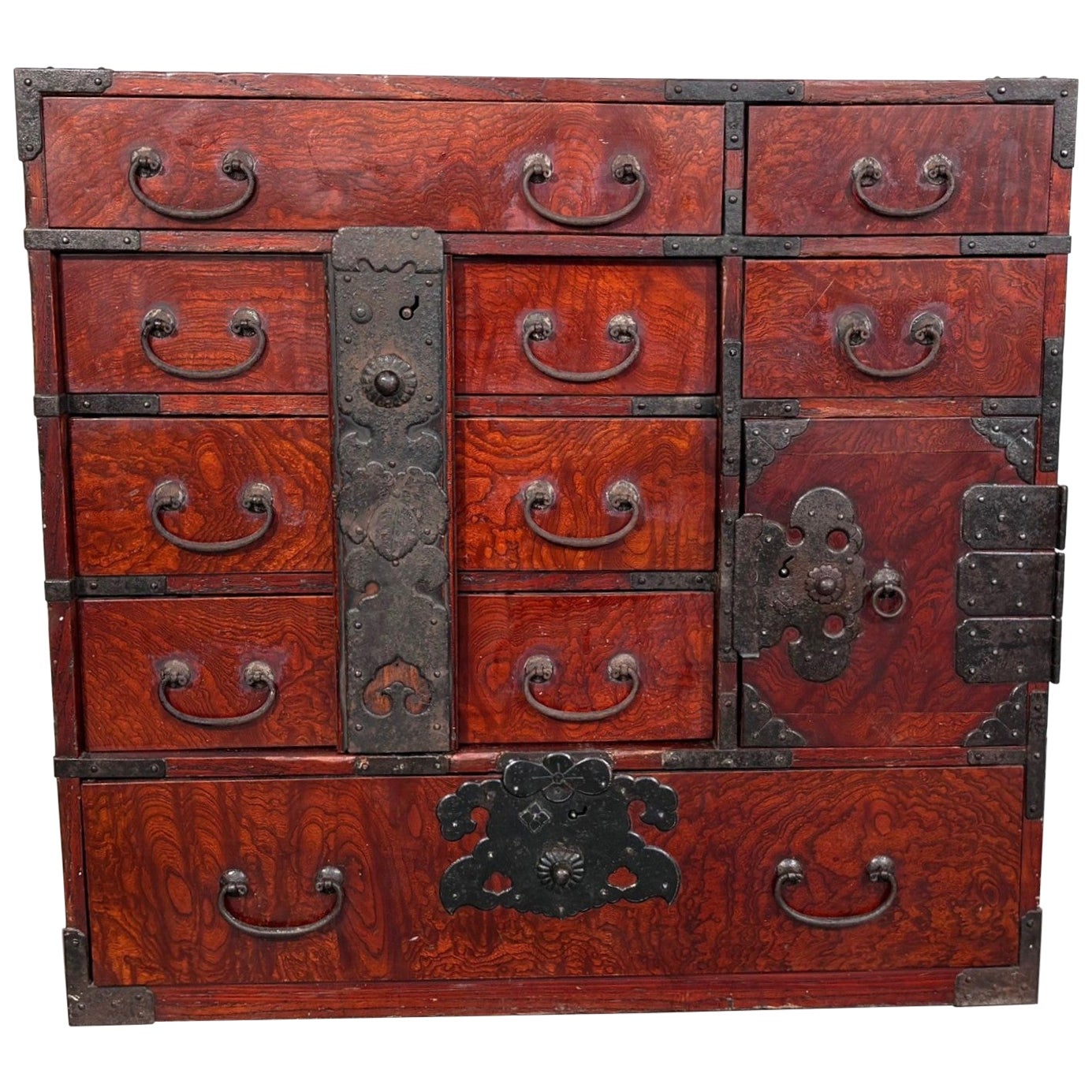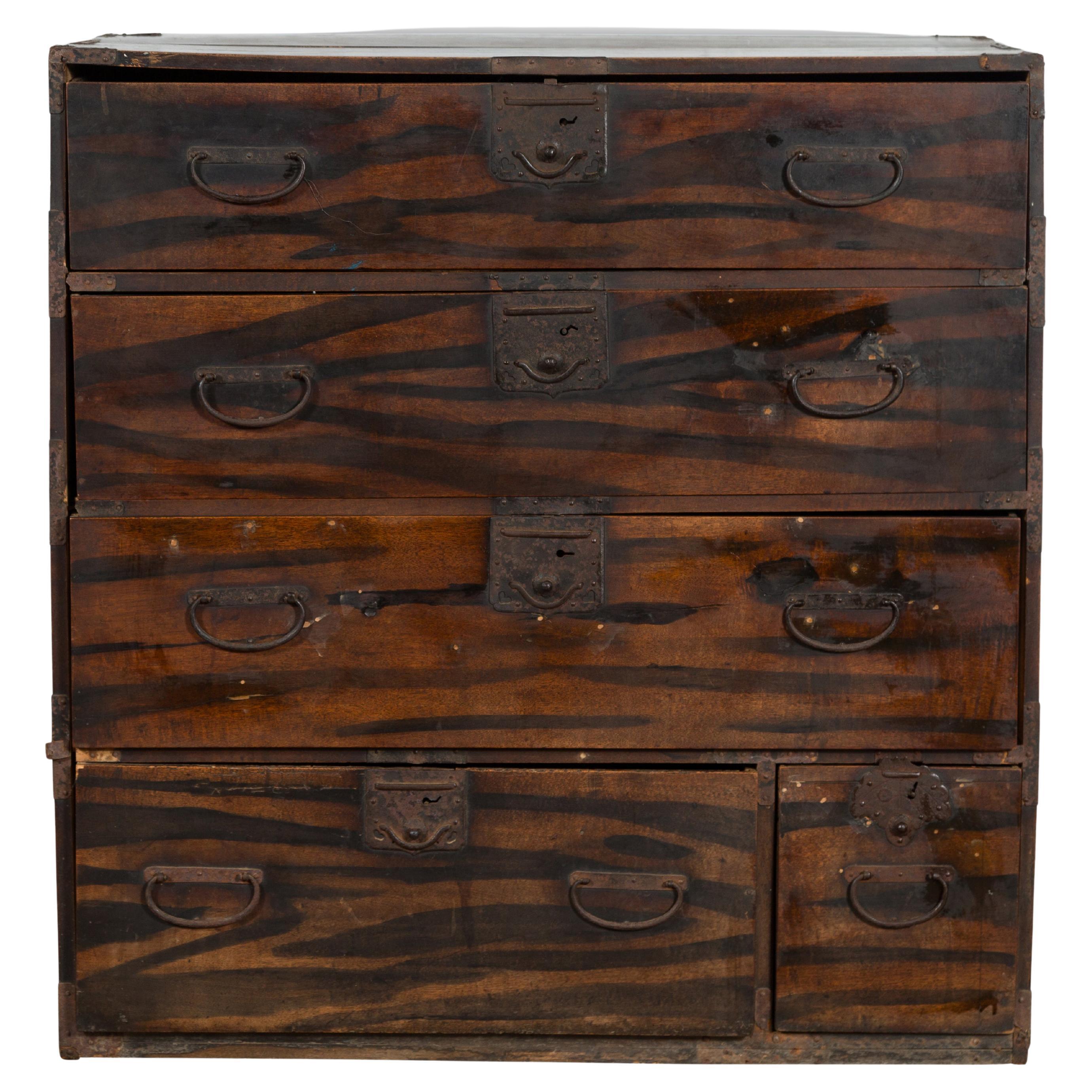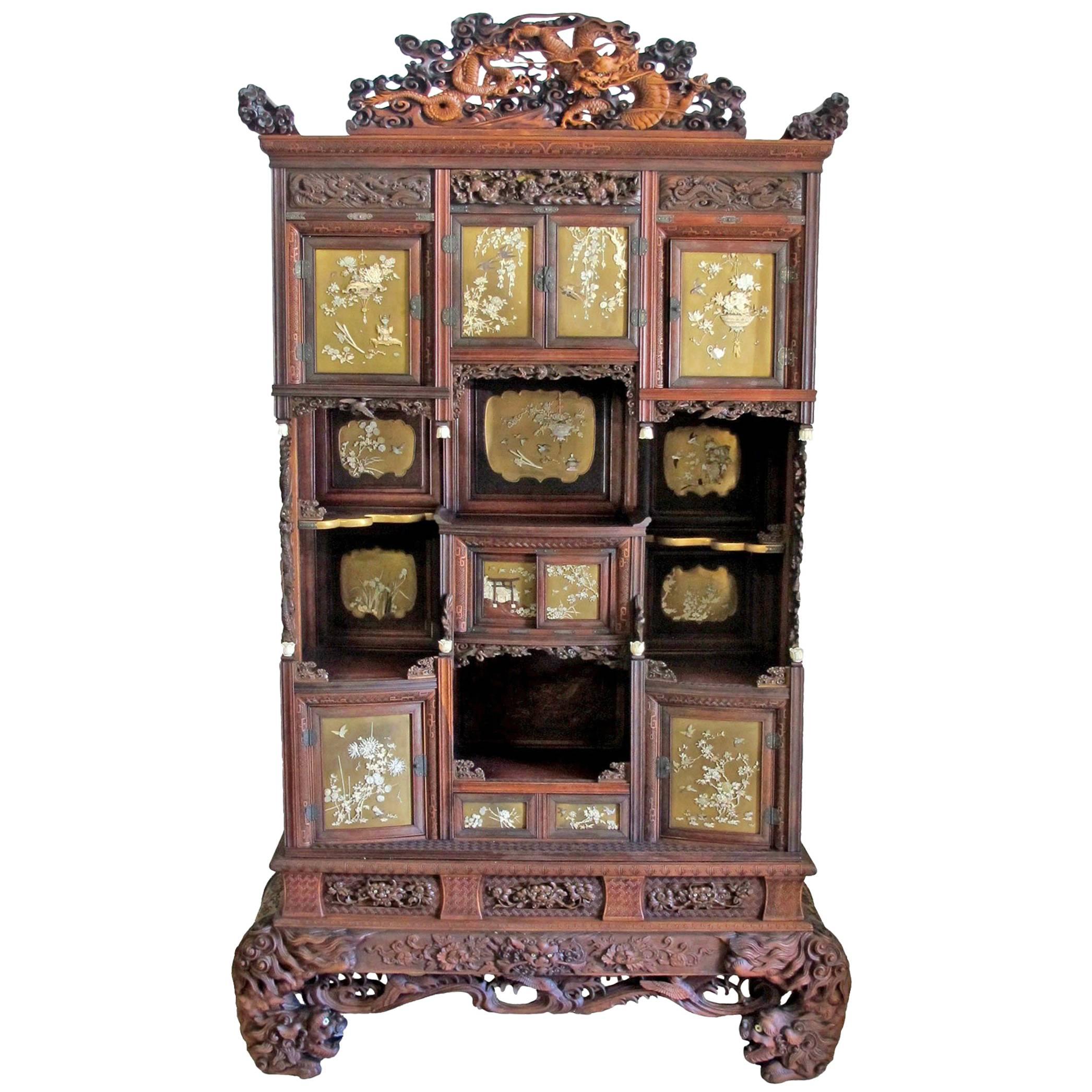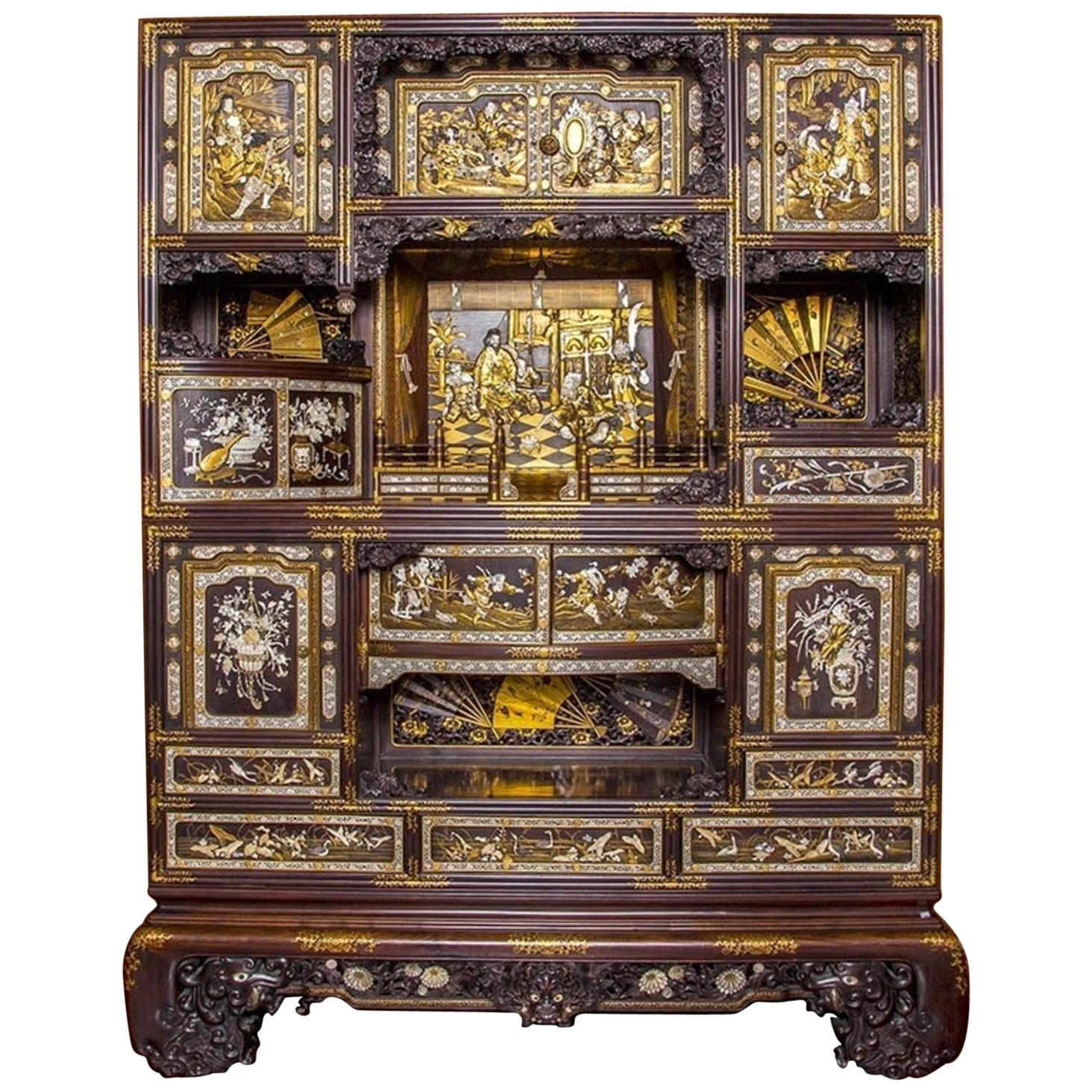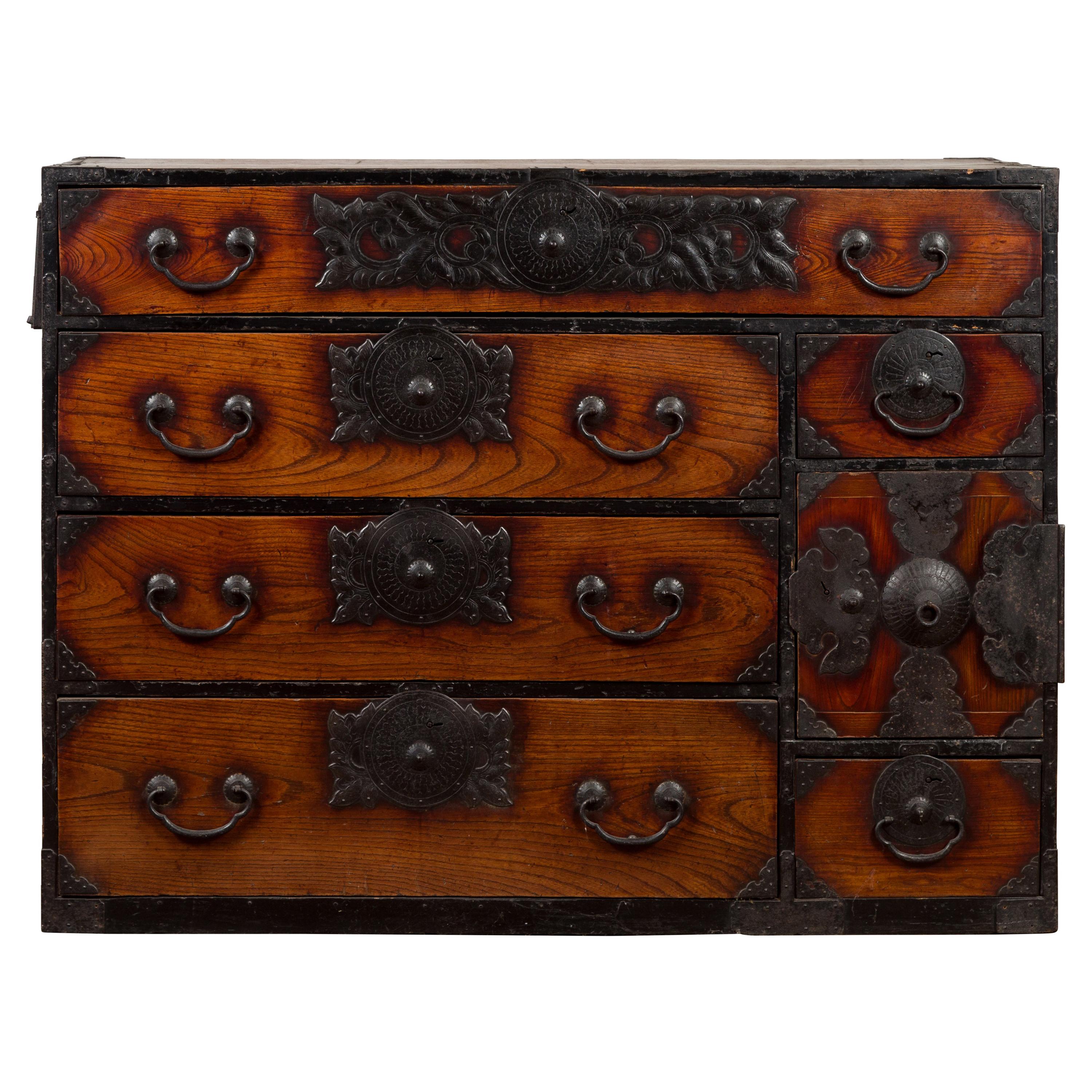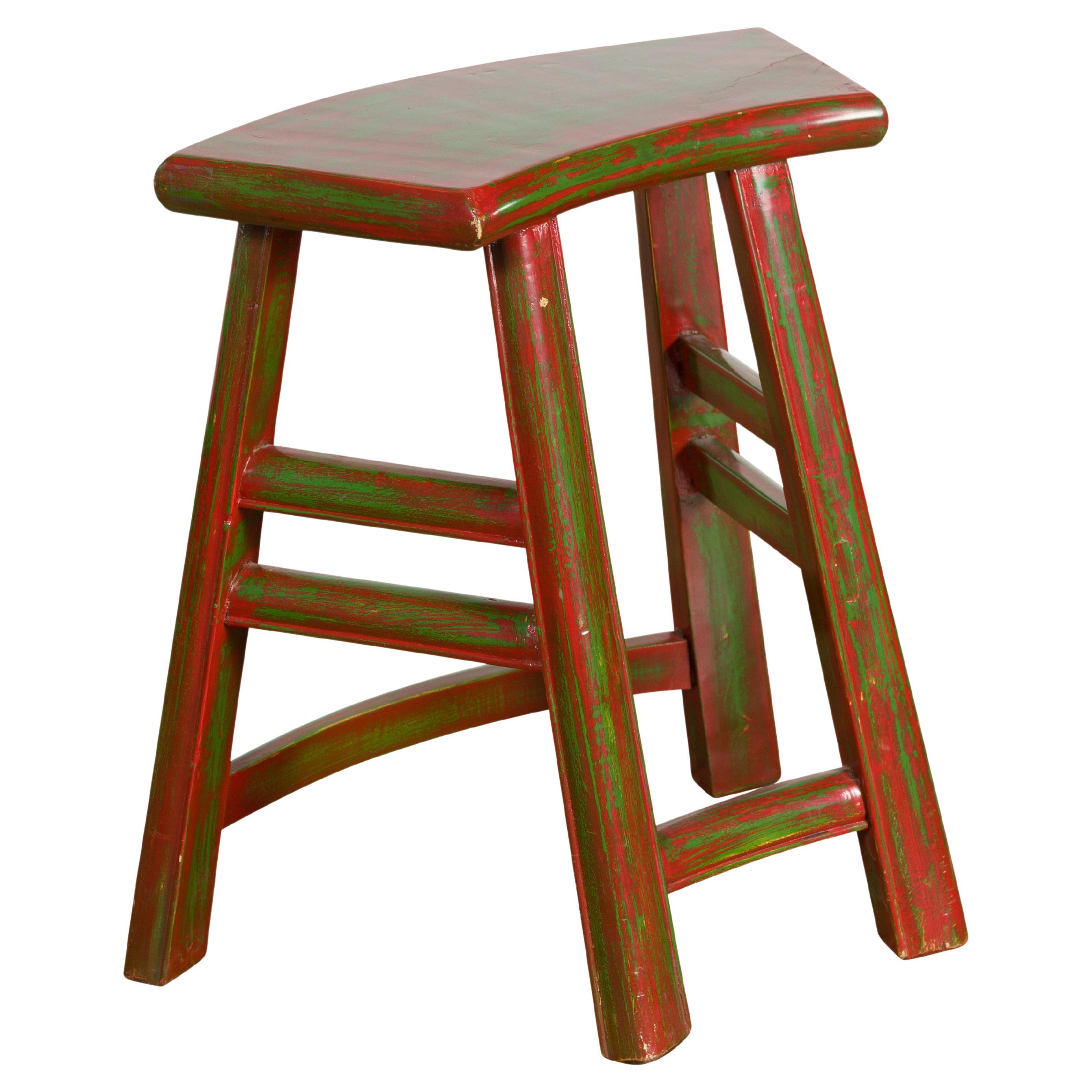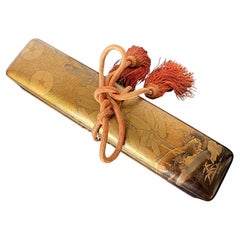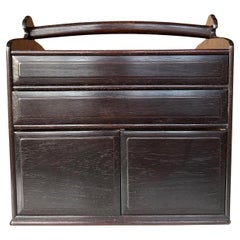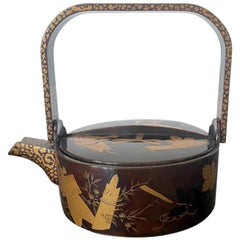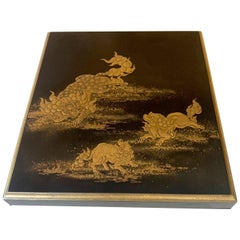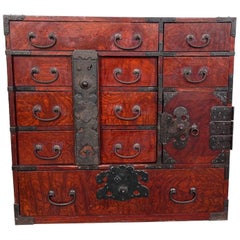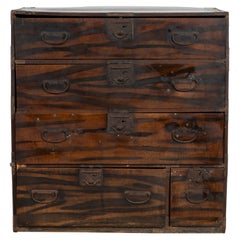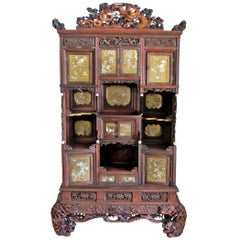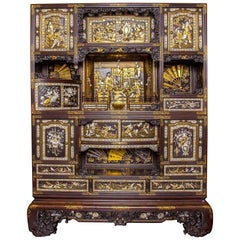Items Similar to Japanese Maki-e Lacquered Wood Kodansu Small Chest with Drawers Meiji Period
Want more images or videos?
Request additional images or videos from the seller
1 of 18
Japanese Maki-e Lacquered Wood Kodansu Small Chest with Drawers Meiji Period
About the Item
An antique Japanese Kodansu with two compartments and multiple drawers with red lacquer finish and gold Maki-e and wonderful Raden shell inlays decoration. This rather unusual piece was likely made on Ryukyu Islands circa late 19th century as a desk-top chest for small jewelry and valuables for the export market. The configuration was not typical Japanese Kodansu but more influenced by earlier Namban chests made for the west during Momoyama period and resembles a European miniature bureau or secrétaire. The upper part features a roll top door that opens to five small drawers and a central secret compartment with a removable panel. The lower part is enclosed behind a tambour door subtly inlayed with fine abalone shells (Raden) that shimmers on a dark background. The tambour door slides to reveal four drawers on two rows. The exterior of the chest was lacquered red on which elaborate gold Maki-e, both hiramaki-e and takamaki-e, were used to depict several sceneries. These include two large vignettes of pheasants under bamboos and star-leaf plants on top, and mandarin ducks nesting on the branch of a flowering plum trees on the roll top door. Sandwiched in between is a classic landscape of boats sailing on the water with mountains in the background, set within a cartouche with geometrical border. Both sides were decorated with gilt floral painting that depicts orchids and vining flowers. The back was finished as well in a similar manner. The interior drawers were lacquered black on which gilt floral motifs were painted. The inner surface of the drawers was all finished in a lovely Mura-Nashiji cluster motifs, showing the attention to the details by the artisans. Chased copper hardware were used as braces on the corner of the cabinet as well as the mini pulls for the drawers.
- Dimensions:Height: 14.25 in (36.2 cm)Width: 14.75 in (37.47 cm)Depth: 9.25 in (23.5 cm)
- Style:Meiji (Of the Period)
- Materials and Techniques:
- Place of Origin:
- Period:
- Date of Manufacture:19th century
- Condition:Wear consistent with age and use. Minor fading. Good antique condition with age-related wear and patina overall, scattered tiny losses. abrasions, dings and scratches mostly on surface with frequent contact. Areas of discolorations and possibly old restoration on one side along a midline crack.
- Seller Location:Atlanta, GA
- Reference Number:1stDibs: LU945042739562
About the Seller
4.9
Platinum Seller
Premium sellers with a 4.7+ rating and 24-hour response times
Established in 2006
1stDibs seller since 2010
554 sales on 1stDibs
Typical response time: <1 hour
- ShippingRetrieving quote...Shipping from: Atlanta, GA
- Return Policy
Authenticity Guarantee
In the unlikely event there’s an issue with an item’s authenticity, contact us within 1 year for a full refund. DetailsMoney-Back Guarantee
If your item is not as described, is damaged in transit, or does not arrive, contact us within 7 days for a full refund. Details24-Hour Cancellation
You have a 24-hour grace period in which to reconsider your purchase, with no questions asked.Vetted Professional Sellers
Our world-class sellers must adhere to strict standards for service and quality, maintaining the integrity of our listings.Price-Match Guarantee
If you find that a seller listed the same item for a lower price elsewhere, we’ll match it.Trusted Global Delivery
Our best-in-class carrier network provides specialized shipping options worldwide, including custom delivery.More From This Seller
View AllJapanese Lacquered Gold Maki-E Naga Fubako Meiji Period
Located in Atlanta, GA
A Japanese lacquered wood Naga Fubako (a long box used to store document or large scroll painting), circa 19th century Meiji period. The rectangular box features an unusually deep lipped lid with slightly rounded corners, a conforming lower box with bronze medallion rings with tasseled...
Category
Antique 19th Century Japanese Meiji Lacquer
Materials
Wood, Lacquer
Fine Japanese Portable Tea Cabinet Meiji Period with Provenance
Located in Atlanta, GA
An antique Japanese portable cabinet finely fashioned out of Sandalwood, a fragrant and also one of the most expensive woods that was used to make small luxury pieces. The handled ca...
Category
Early 20th Century Japanese Meiji Furniture
Materials
Wood, Sandalwood
Japanese Lacquer Maki-e Sake Ewer Meiji Period
Located in Atlanta, GA
A Japanese lacquered wood sake ewer with maki-e design, circa late 19th century, Meiji period. The nicely decorated lacquerware is of a Classic sake ewer for...
Category
Antique 1890s Japanese Japonisme Lacquer
Materials
Lacquer
Japanese Lacquer Box with Fine Maki-e Decoration Meiji Period
Located in Atlanta, GA
A lacquered wood box with lid from Japan circa 19th century Meiji Period. The finely decorated box was used to store paper slips and small documents on the desk. It is overall finished with black lacquer (kuro) with sparse Mura-Nashiji effect outside and on the top surface of the lid, there are three Komainu, (sometimes known as Shishi or Japanese lions) frolicking and forming a circle in lively motion. Komainu are auspicious animals in Japanese cultures in both Shinto and Buddhism tradition. Originally from China, these animals symbolizes guardians to ward off evil spirits. Hiramaki-e was used in combination with carving and combing to render the lions with various surface textures. A gilt border with an slight angle was given to the lid and even the thin band is decorated with miniature floral scrolls. The interior of the box was finished in a dense nashiji. Underneath the lid, a cluster of peonies open lavishly by two gentle mounts. Takamaki-e (high relief) in both gold and silver were...
Category
Antique Late 19th Century Japanese Japonisme Lacquer
Materials
Wood, Lacquer
Large Japanese Lacquer Tray with Maki-e Carp Design Meiji Period
Located in Atlanta, GA
A large rectangular tray with scalloped corners and slightly raised gallery rim circa late 19th century to early 20th century (end of Meiji period). The center image showcases a live...
Category
Early 20th Century Japanese Japonisme Lacquer
Materials
Lacquer
Japanese Meiji Han Koto with Maki-e Lacquer Decoration
Located in Atlanta, GA
A rare Japanese Koto made from carved Paulownia wood and lavishly decorated with lacquer Maki-e circa late 19th century of Meiji Period (1868-1912). The ...
Category
Antique Late 19th Century Japanese Japonisme Lacquer
Materials
Wood
You May Also Like
Japanese Meiji Period Tansu Chest
Located in Pomona, CA
A Japanese Meiji period keyaki wood Sendai tansu clothing chest from the late 19th century, with hand-cut iron hardware.
Category
Antique 1890s Japanese Furniture
Materials
Iron
Japanese Meiji Zebra Wood Tansu Chest in Isho-Dansu Style with Five Drawers
Located in Yonkers, NY
A Japanese Meiji period single section tansu clothing chest from the late 19th century in Isho-dansu style, with zebra wood, five drawers and carrying handles. Created in Japan during the Meiji period in the later years of the 19th century, this wooden Isho-dansu clothing chest features a linear silhouette perfectly complimented by a dark zebra wood grain. The organized façade showcases five drawers (three large ones followed by two smaller ones at the bottom), each fitted with iron hardware made of C-scroll handles and a central lock. Tansus were portable chests...
Category
Antique Late 19th Century Japanese Meiji Commodes and Chests of Drawers
Materials
Iron
Japanese Carved and Lacquered Shibayama Cabinet, Meiji Period
Located in San Francisco, CA
An elaborate and finely detailed carved wood, and gold lacquered Shibayama cabinet (Chigaidansu). Having beautifully applied semi-precious stone and ...
Category
Antique 19th Century Japanese Meiji Furniture
Materials
Mother-of-Pearl, Wood
Rare Meiji Period Japanese Lacquer Cabinet
Located in West Palm Beach, FL
Large, rare and important Meiji period, late 19th century, Japanese lacquer cabinet
Meiji period (1868-1912)
19th century
In three parts, desi...
Category
Antique 19th Century Furniture
Materials
Wood
Japanese Meiji Period Keyaki Wood Tansu Clothing Chest in the Sendai Style
Located in Yonkers, NY
A Japanese Meiji period keyaki wood Sendai tansu clothing chest from the late 19th century, with hand-cut iron hardware and safe box. Created in the Sendai Prefecture during the last quarter of the 19th century, this keyaki (elm) wood tansu is a fine example of Japan's traditional mobile cabinetry. Featuring a lacquered finish with reddish brown tones, the chest showcases a rectangular top, sitting above a perfectly organized façade. A long upper...
Category
Antique Late 19th Century Japanese Meiji Cabinets
Materials
Iron
Japanese Late Meiji Period Red and Green Lacquered Stool with Semicircular Seat
Located in Yonkers, NY
A Japanese late Meiji period red lacquered stool from the early 20th century, with hand painted green accents, semi circular top, four splaying legs and side stretchers. Created in J...
Category
Early 20th Century Japanese Meiji Stools
Materials
Wood
Recently Viewed
View AllMore Ways To Browse
Asian Jewellery
Meiji Wood
Meiji Wood Furniture
Chest With Gold Detail
Japanese Wood Door
Secret Compartment Furniture
Black Japanese Chest
Japanese Meiji Panel
Antique Shell Inlay
Japanese Gilt Wood
Used Exterior Wood Doors
Antique Furniture With Secret Compartments
Japanese Hardware
Japanese Wood Chest
Black Lacquer Asian Painting
Japanese Wood Desk
Antique Japanese Desk
Antique Braces
